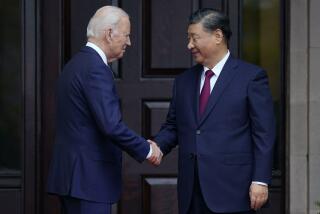Windows of opportunity
- Share via
CHINESE PRESIDENT HU JINTAO arrives in the U.S. today to meet the most powerful man in America. On Thursday, he’ll meet with President Bush.
Diplomatic visits tend to be highly symbolic affairs, and when the visitor is a Chinese head of state, the protocol maneuvers become as tightly choreographed as a tai chi exhibition. So there’s plenty of meaning to be read into Hu’s dinner tonight with Microsoft Corp. co-founder and Chairman Bill Gates and other business leaders, as well as his visits to the Microsoft campus and the offices of Seattle’s other business behemoth, Boeing Co.
The two represent polar opposites when it comes to the experiences of American companies doing business in China. Boeing has steadily increased its sales to a nation where skyrocketing economic growth has brought pressing demand for more air travel and hence more Boeing aircraft. Microsoft, on the other hand, has fought unsuccessfully for more than a decade to make headway in a Chinese market where software piracy is rampant and profits for foreign manufacturers elusive.
Hu hopes to show U.S. business leaders, and an increasingly restive Congress, that Beijing’s leadership is working to make companies like Microsoft, which rely on intellectual property rights, as successful in China as companies like Boeing, which don’t. Earlier this month, China sent its largest-ever trade delegation to the U.S. with a treasure chest of offerings, including orders for 80 Boeing aircraft and a deal from China’s biggest PC makers to install legitimate copies of Microsoft’s Windows on their products.
But a deeper meaning to be read in Hu’s visit to Seattle is that it’s China’s increasing economic clout, more than its increasing role in geopolitics, that will most affect the world in the 21st century. Bush is expected to push Hu to take a more responsible role on the international stage through actions such as urging North Korea and Iran to give up on nuclear weapons, pressuring Sudan to stop slaughtering its own people and turning the yuan into a truly free-floating currency.
But few analysts expect him to win anything concrete. Thus, Hu’s meeting with Gates and his cohorts will probably be far more productive than Thursday’s talks between the two presidents.
Neither the U.S. nor China has much leverage over the other; their economic links are simply too great, their military strength too devastating. For the most part, Beijing is content to maintain the status quo because for China that means a 10% annual growth rate and commensurate rises in global clout. Until Hu sees the benefits of being what Deputy Secretary of State Robert B. Zoellick has been calling a “responsible stakeholder” in global affairs, U.S. ties to China are likely to be tighter in places like Seattle -- and Los Angeles, whose ports are overflowing with Chinese goods -- than in Washington.






